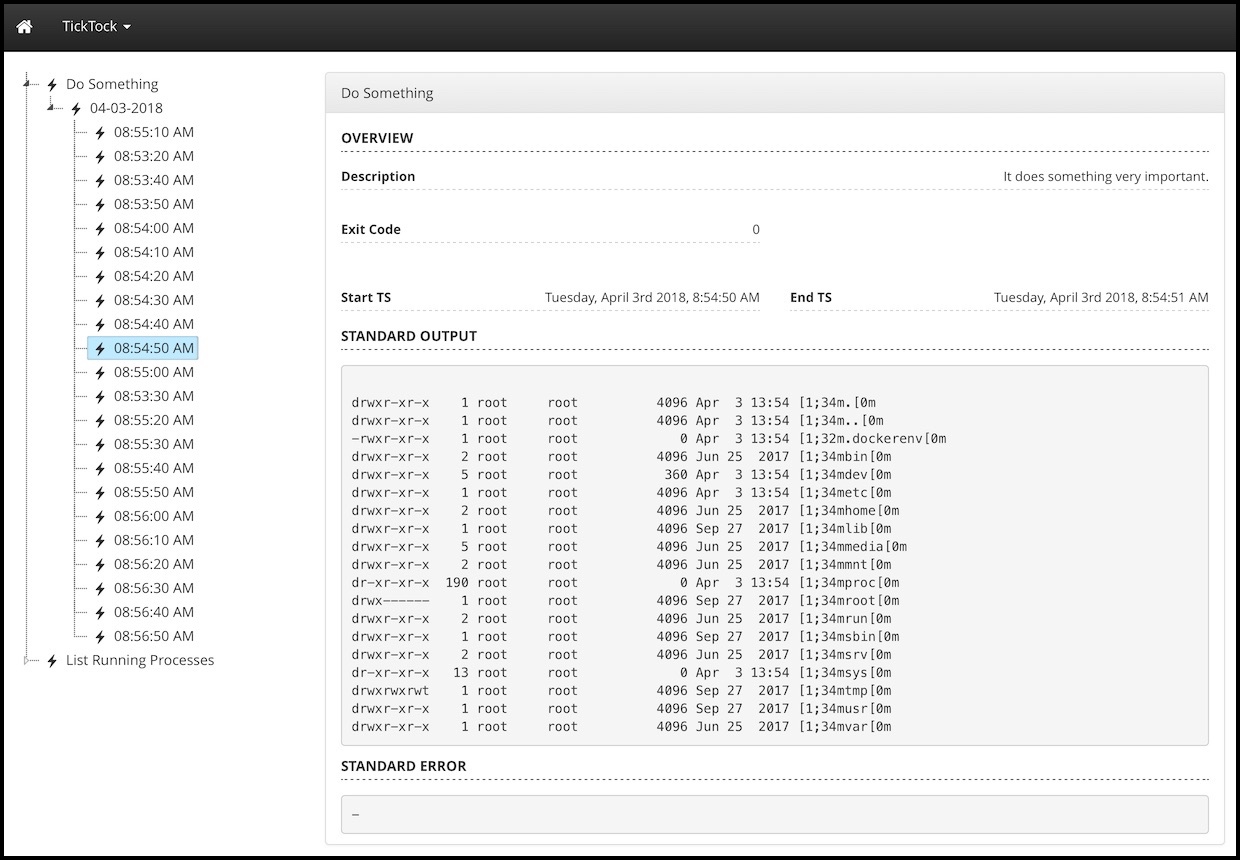TickTock runs scheduled tasks within Docker containers. Each task can be independently configured to run within an existing container or within a container that is automatically created and subsequently removed. TickTock includes built-in support for sending task notification emails via SMTP. It can also be extended to send notifications using a custom service that you provide in the form of a Node.js script.
The interval at which a task is run is defined using natural language with the help of the Later module. For example, to execute a task every ten minutes you would simply set an interval of every 10 minutes. Standard crontab intervals are also supported.
TickTock provides a visual front-end (accessible via the browser) through which you can view execution results.
A configuration file (more on that below) must be mounted into the TickTock container at /config.yml.
version: '3.4'
services:
ticktock:
image: tkambler/ticktock
volumes:
- ./example/config.yml:/config.yml
- ./data:/var/ticktock
- /var/run/docker.sock:/var/run/docker.sock
# Username / password for web admin panel
admin:
username: username
password: password
# Mandatory. An array of task descriptions.
tasks:
- title: Do Something
description: It does something very important.
interval: every 10 seconds
# Valid values: run, exec
# A `run` task runs within a container that is created and removed for each execution.
type: run
image: mhart/alpine-node:8.6.0
command: ["ls", "-al"]
# If overlap is enabled, tasks will continue to be executed, even if previous executions
# have not yet completed. Default: false
overlap: false
# If true, automatically execute the task when TickTock is first launched. Default: false
execute_on_start: true
# Default: true
enabled: false
- title: List running processes
description: It lists running processes.
interval: every 10 seconds
# You can also define the interval using the crontab format (see below).
# interval: "23 16 * * *"
# Valid values: run, exec
# An `exec` task runs within a pre-existing container that has already been started.
type: exec
# The name of the container within which the task will be executed.
container: container1
command: ["ps", "aux"]
overlap: false
enabled: true
# If specified, each time the task is run a random number between 0 and the provided value
# will be generated. Execution of the task will then delayed by that number of seconds.
random_delay: 20
# If SMTP notifications have been configured, you can pass an array of recipients here.
email:
- foo@localhost.site
- herp@derp.com
# Optional. If set, notifications will be combined into a single email that is sent out
# after x number of executions have occurred.
batch_email_interval: 10
# Optional.
email:
smtp:
from_name: TickTock
from_email: ticktock@localhost.site
# Values stored under the `config` property are passed directly to NodeMailer.
# Configuration details can be found here: http://nodemailer.com/smtp/
config:
host: maildev
port: 25
secure: false
tls:
secure: false
ignoreTLS: true
rejectUnauthorized: false
Create a terminal session within the running TickTock container and run the script as shown below. You will be presented with a list of available tasks. Make a selection, and it will be immediately executed.
$ docker-compose exec ticktock sh
$ ./execute
Create a terminal session within the running TickTock container and run the script as shown below. You will be presented with a list of defined tasks, including the previous and next execution times for each task.
$ docker-compose exec ticktock sh
$ ./report
TickTock can be extended to send task notifications to a custom provider of your choosing. To do so, mount a Node application into the container as shown below.
version: '3.4'
services:
ticktock:
image: tkambler/ticktock
volumes:
- ./example/notifications:/opt/ticktock/notifications
- ./example/config.yml:/config.yml
- /var/run/docker.sock:/var/run/docker.sock
In this example, we've mounted a notifications folder into the container at /opt/ticktock/notifications. This folder must contain a Node script named index.js that exports a single function, as shown below.
/**
* @param task - An object describing the task that was executed.
* @param res - An object (or an array of objects, if batching was enabled) that describes the execution's result(s).
*/
module.exports = (task, res) => {
// Forward to Slack, REST endpoint, IRC, etc...
};
